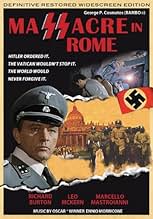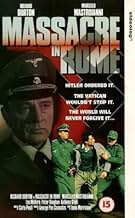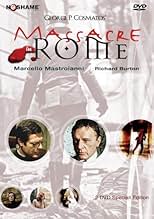IMDb-BEWERTUNG
6,5/10
1602
IHRE BEWERTUNG
Füge eine Handlung in deiner Sprache hinzuRome, March 23, 1944: 33 German soldiers are killed by a bomb. Lt. Col. Herbert Kappler is ordered to execute ten times that many Italians.Rome, March 23, 1944: 33 German soldiers are killed by a bomb. Lt. Col. Herbert Kappler is ordered to execute ten times that many Italians.Rome, March 23, 1944: 33 German soldiers are killed by a bomb. Lt. Col. Herbert Kappler is ordered to execute ten times that many Italians.
- Auszeichnungen
- 1 Gewinn & 1 Nominierung insgesamt
Empfohlene Bewertungen
This movie has a chilling subject matter, but there are a few too many unnecessary distractions along the way, which prevent it from getting down to the heart of the story as quickly as it should. It's still worth seeing, however, especially for fans of Richard Burton, who gives a compelling performance as a man caught in a mechanism that far surpasses him and forces him to do unthinkable deeds. And all this despite the obvious fact that Burton is miscast as a German officer with a distinctly British accent. (**1/2)
An Italian war drama; A story depicting the background and events leading up to one of the most devastating wartime atrocities in modern history, the Adreatine Massacre in Rome in 1944. Thirty-three members of the German 11th Company, 3rd Battalion, SS Police Regiment 'Bozen', were attacked and gunned down by the Roman underground. Hitler's reprisal was to order the deaths of ten Roman civilians for each of the thirty-three SS soldiers killed. The Pope ordered that one Roman priest collaborate with the SS to carry it out. George P. Cosmatos directs the drama with a palpable emphasis on plot. Darkly lit to create a looming atmosphere and uncompromising scenes works well. The dialogue moralises about non-involvement, which becomes heavy at times, and there are also many inaccuracies. The character of the Head of the Security Police, Herbert Kappler, was a ruthless war criminal and not war-weary and troubled, as portrayed here by Richard Burton. The German victims in the story were regular Austrian soldiers. Of lesser importance, though, is Father Pietro Antonelli being a composite character. It's a bit cumbersome as it progresses, but as a story, it is interesting for the dilemma of reprisal and absorbing for the conflicting views of morality. Good drama arises from face-to-face confrontations.
This is a retelling of the events leading up to the Ardeatine Massacre, which took place just outside of Rome during World War Two, and the attempts to prevent it happening by various people involved.
The massacre was a direct response by the SS in retaliation for partisan bomb that was detonated in the middle of Rome while an SS company was marching through the city, and the order to kill ten men for every German soldier killed came direct from Adolf Hitler himself. There's a lot of controversy regarding the Vatican's knowledge about the event too, and the film does a good job of drawing attention to this without being completely accusatory.
Richard Burton plays Col. Keppler, a weary SS officer who loves Rome. Along with arrogant Prussian adjutant John Steiner, he knows that the Third Reich is ending and his main concern is that his name is announced by the BBC on their war crimes list that is broadcast every night. Burton seems genuinely concerned for the people of Rome, while Steiner just wants to save his arse. Marcello Mastroianni is the local priest involved in art restoration who strikes up an uneasy friendship with Burton, although conversation usually devolves into the two throwing veiled insults at each other. The Italian fascists want to celebrate the anniversary of fascism openly but Burton suggests that they do it behind doors, as Rome has become a bit of a ticking bomb politically. His commanding officer, old school General Leo McKern, plays down the possibility of an attack but then blames Burton when the entire company are blown away by partisans Giancarlo Prete and Renzo Palmer (both of whom speak perfect English, despite always being dubbed in any other film I've seen them in).
The film then becomes a kind of reverse Schindler's List as Burton must find ten men for every soldier killed - 320 in total. Burton at first adds all the political and condemned prisoners on the list, then all the jews, then anyone else he can find while both Steiner and Mastroianni separately contact the Vatican in order the step in and have the Pope try and prevent the massacre. Guess what happens there? Despite the avalanche of later Nazisplotation films Italy would dump on the world, this one is played one hundred percent straight with no over the top violence and nudity, just people acting their socks off. The most tense part of the film is when the partisans are waiting for the SS company to show up, as Giancarlo Prete constantly chases off the locals while trying to hide a bomb in his dust cart. Burton plays the burned-out SS soldier in a sympathetic way, but it's still hard to feel sorry for a guy who is basically preparing a list of people to be murdered. Steiner makes a mark as an officer who just oozes Prussian arrogance, and it's nice to see him in something a bit more serious than usual.
Of course, the Italians would take a huge dump on the memories of everyone in the war, and their own nefarious involvement in it, by making such films as Achtung! The Desert Tigers, Women's Camp 119, The Beast In Heat, Nazi Love Camp 27, SS Experiment Love Camp, Deported Women of the Special SS Section, The Red Nights of the Gestapo, The Gestapo's Last Orgy (aka Caligula Reincarnated as Hitler), SS Camp 5: Women's Hell, and Hitler's Last Train. You were on their side, you tw*ts!
Richard Burton plays Col. Keppler, a weary SS officer who loves Rome. Along with arrogant Prussian adjutant John Steiner, he knows that the Third Reich is ending and his main concern is that his name is announced by the BBC on their war crimes list that is broadcast every night. Burton seems genuinely concerned for the people of Rome, while Steiner just wants to save his arse. Marcello Mastroianni is the local priest involved in art restoration who strikes up an uneasy friendship with Burton, although conversation usually devolves into the two throwing veiled insults at each other. The Italian fascists want to celebrate the anniversary of fascism openly but Burton suggests that they do it behind doors, as Rome has become a bit of a ticking bomb politically. His commanding officer, old school General Leo McKern, plays down the possibility of an attack but then blames Burton when the entire company are blown away by partisans Giancarlo Prete and Renzo Palmer (both of whom speak perfect English, despite always being dubbed in any other film I've seen them in).
The film then becomes a kind of reverse Schindler's List as Burton must find ten men for every soldier killed - 320 in total. Burton at first adds all the political and condemned prisoners on the list, then all the jews, then anyone else he can find while both Steiner and Mastroianni separately contact the Vatican in order the step in and have the Pope try and prevent the massacre. Guess what happens there? Despite the avalanche of later Nazisplotation films Italy would dump on the world, this one is played one hundred percent straight with no over the top violence and nudity, just people acting their socks off. The most tense part of the film is when the partisans are waiting for the SS company to show up, as Giancarlo Prete constantly chases off the locals while trying to hide a bomb in his dust cart. Burton plays the burned-out SS soldier in a sympathetic way, but it's still hard to feel sorry for a guy who is basically preparing a list of people to be murdered. Steiner makes a mark as an officer who just oozes Prussian arrogance, and it's nice to see him in something a bit more serious than usual.
Of course, the Italians would take a huge dump on the memories of everyone in the war, and their own nefarious involvement in it, by making such films as Achtung! The Desert Tigers, Women's Camp 119, The Beast In Heat, Nazi Love Camp 27, SS Experiment Love Camp, Deported Women of the Special SS Section, The Red Nights of the Gestapo, The Gestapo's Last Orgy (aka Caligula Reincarnated as Hitler), SS Camp 5: Women's Hell, and Hitler's Last Train. You were on their side, you tw*ts!
I like this movie because of its accuracy and the excellent acting of the main cast, and also of the supporting characters. The film is very dry though, and slow, and presumably not meant as pure entertainment. It is, in my view, a more or less accurate depiction of what happened, not a star vehicle for the brilliant actors Richard Burton (Lt. Col. Herbert Kappler) and Marcello Mastroianni (Father Pietro Antonelli). John Steiner is also superb as Col. Dollmann.
This is not a film for thrill-seekers. It is a film for those who enjoy good acting, direction and historical accuracy. The main actors were serious artists, and I am sure they were very happy to participate in this well-crafted, very structured and chilling account of the German occupation of Rome. I give it 8 out of 10 stars, and that's me being conservative.
This is not a film for thrill-seekers. It is a film for those who enjoy good acting, direction and historical accuracy. The main actors were serious artists, and I am sure they were very happy to participate in this well-crafted, very structured and chilling account of the German occupation of Rome. I give it 8 out of 10 stars, and that's me being conservative.
If you pick this for striking scenes of violence,you'd do better to go elsewhere. What remains in my mind after watching it are the performances - especially Richard Burton and Peter Vaughn as soldiers resigned to taking and giving orders they'd rather not take and give - and the methodical way in which the reprisals are ordered, arranged and then carried out.
Every time I hear of some brutal crime, I wonder how it ever began, how people could commit such acts.
But this film gave me an understanding of the process whereby one act/decision leads to another, which leads to another... until there's no stopping it, even if anybody wanted to.
Every time I hear of some brutal crime, I wonder how it ever began, how people could commit such acts.
But this film gave me an understanding of the process whereby one act/decision leads to another, which leads to another... until there's no stopping it, even if anybody wanted to.
Wusstest du schon
- WissenswertesFilmed in the winter of 1972-73, the film had a limited release in the summer of 1975.
- PatzerAll of the SS officers in Kappler's Security Police headquarters are shown to be wearing the Knight's Cross of the Iron Cross, which was a high level decoration for valor and heroism in combat. It would have been highly unusual for so many security officers to have this award, since the Security Police dealt with "behind the lines" actions and not front line combat.
- Zitate
Father Pietro Antonelli: I would prefer a world that didn't need protecting.
Lieutenant Colonel Herbert Kappler: And I would prefer a religion that didn't need priests.
- VerbindungenReferenced in Escape to Athena: Cast and Crew Interviews (1978)
Top-Auswahl
Melde dich zum Bewerten an und greife auf die Watchlist für personalisierte Empfehlungen zu.
- How long is Massacre in Rome?Powered by Alexa
Details
- Erscheinungsdatum
- Herkunftsländer
- Sprachen
- Auch bekannt als
- Massacre in Rome
- Drehorte
- Produktionsfirmen
- Weitere beteiligte Unternehmen bei IMDbPro anzeigen
Zu dieser Seite beitragen
Bearbeitung vorschlagen oder fehlenden Inhalt hinzufügen

Oberste Lücke
By what name was Tödlicher Irrtum (1973) officially released in Canada in English?
Antwort

































